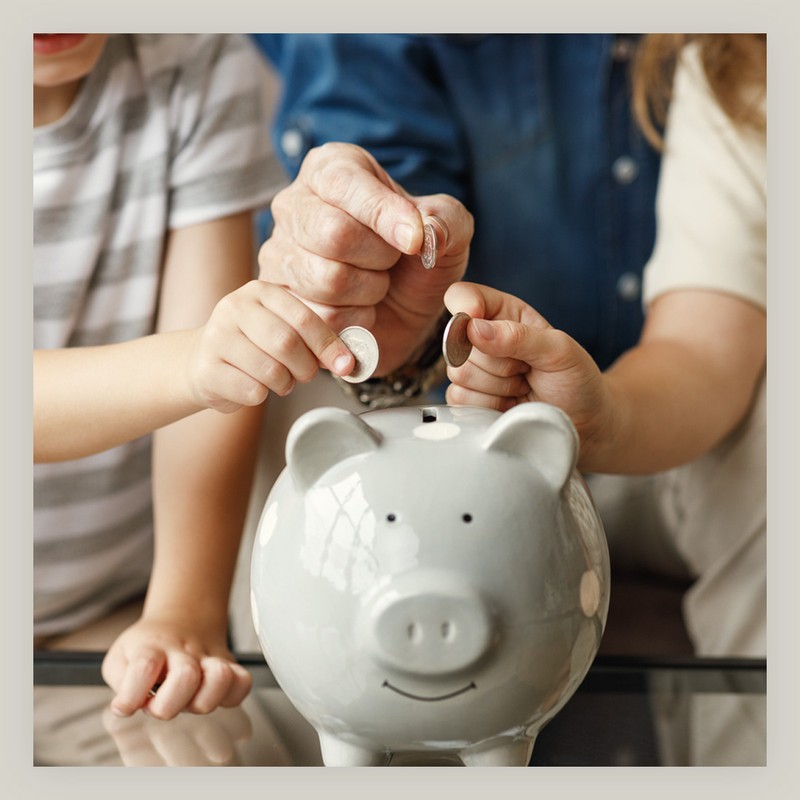
How To Invest For Your Grandchildren
What’s the most important thing to think about before you start saving for your grandchildren?
Alistair McQueen, head of savings and retirement at Aviva says it’s important to look at your own financial situation first and recommends going through three steps before handing any money over. “First, understand how much you can afford to save for others, after your own needs are met. Second, consider where it might be best to save. This decision will be influenced by the amount you have to save and over what time you want to reach a certain goal. Finally, decide how you want to gift any money to your intended recipients. Red tape can surround these payments, particularly in the form of inheritance tax (IHT).”
How can you work out what you can afford to give or save?
First and foremost, says Alistair, it’s important not to neglect your own needs. If you give money to your grandchildren but aren’t left with enough to cover your own expenses, your good intentions might backfire. “You may be required to call upon [your grandchildren] to help make your ends meet, thereby burdening, not helping, them,” Alistair warns. “A simple monthly budget of regular incomings and outgoings will help you understand how much you can afford to save. The government-backed Money Advice Service has a great online planner to help you.”
Can you set up a savings account for your grandchildren?
Yes, as a grandparent, you can open a savings account in your grandchild’s name, as long as you have proof of their identity (like a birth certificate). Interest your grandchild earns on these savings may not be subject to tax, if a grandparent gave them the money – but more on this later.
How can you help your grandchildren get on the property ladder?
If giving your grandchild help with a deposit is the most valuable contribution you can make, it is possible to gift the whole sum, or just a percentage, but if the amount is more than £3,000 you must live longer than seven years to avoid inheritance tax. If you’re planning a deposit gift for someone buying a home with a new partner, you can create a Deed of Trust to protect your family’s share in the purchase. This means that if the relationship ends, you can make sure your money stays with you or your loved one. “Our research shows many first-time buyers view the money for a deposit as a ‘gift’ that doesn’t need to be paid back. The Barclays Family Springboard Mortgage has been specifically designed to remove the financial burden from parents and grandparents to ensure they receive their deposit with interest at the end of the five-year fixed-rate period,” says Hannah Bernard, head of mortgages at Barclays.
What about investing in the stock market on their behalf – is that a good idea?
Investments can garner bigger returns than cash interest, and seeing as there are very few children's savings accounts offering upward of 3% AER, investing in stocks and shares could beat that rate, explains Danielle Richardson at Which? “There's plenty of time for investments to grow, too. If you start investing when your child is young, you have a better chance of your investment growing – and overcoming any rocky patches that can have more of an effect on shorter-term investments.” However, if there's a dip in the market, you could lose money. “The success of your investments is dependent on the market, and any dips will be reflected in your balance,” says Danielle. “There's no guarantee you'll get back the money you invested, and any savings may not be covered by compensations schemes unlike with a UK bank or building society.” You may also have to make regular payments to these investment platforms. “There may be monthly or annual fees to pay to use some investment platforms, along with management fees for buying and selling shares,” warns Danielle. “If you take a more hands-on approach and decide to manage the fund yourself, other fees may apply.”
Let’s talk inheritance tax – how do you save or gift money in a tax-efficient way?
The tax paid on an estate when we die applies to money, property and possessions valued over £325,000 (or £475,000, if our children or grandchildren are inheriting it), explains Alistair, and there are a couple of things you can legitimately do to reduce inheritance tax – so your grandchildren could benefit from them, too.
Gift £3,000 and avoid inheritance tax
Everyone has a £3,000 ‘annual allowance’ they can give away to whoever they like, tax-free. This amount won’t be counted as part of your estate for inheritance tax purposes, either.
Gift money to potentially reduce inheritance tax
If you want to give your grandchildren more than £3,000 in a year, it won’t be liable for inheritance tax if you live for at least seven years after passing on the cash. That’s thanks to something known as a ‘potentially exempt transfer’. You can give away as much money as you like, as long as it doesn’t affect your own circumstances. Of course, if you don’t live for a further seven years, the money will be counted as part of your estate, warns Alistair. “As a guide, if you want to gift more than £3,000 to any one person in any one financial year, you may risk incurring inheritance tax on that payment. In these circumstances it would be good practice to seek the support of a financial adviser before doing so.”
Finally, how can you make sure loved ones are responsible with the money you give or save?
It’s always advisable that you use an independent financial advisor, and there’s no reason older grandchildren couldn’t eventually make use of their own services, too. However, another option to consider is a trust – particularly if you want to hand over larger sums of money and have a say in what, and when, it’s used. Lee Platt, a Barclays wealth planner, says: “With changing family dynamics, a trust can provide further options for flexibility and control when making large cash gifts. It can help give you a choice of financial support you offer to loved ones in the future. However, this is a complex area and professional advice should be sought.”

Want to know more? Here are some ways to save money for your grandchildren…
Junior ISAs
If you want to make sure your grandchildren save their money, you can lock it away until they turn 18 in a Junior ISA. Your grandchild’s parent (or legal guardian) will need to open it on their behalf, but anyone can pay in up to £9,000 tax-free each year. No one else can access it, including you and your grandchild’s parents. “There are currently about one million Junior ISAs open in the UK, among about 14 million children under the age of 18, so they are popular,” says Alistair.
Lifetime ISAs
For grandchildren aged 18-39 there’s the option of saving in a Lifetime ISA (LISA). This is a special kind of ISA which lets individuals save up to £4,000 every tax year towards a first home (or retirement), with the government adding a 25% bonus on top of what you save. Should you max out the limit each year, there’s a free £1,000 on offer, too. Plus, you can earn interest on whatever you save, and as it's an ISA, that interest is tax-free. A LISA would need to be opened by the individual grandchild, but you could provide the monthly cash.
Children’s Savings Accounts
For a more flexible way to save money for your grandchildren, a children’s savings account is an option, says Alistair. The money can be accessed at any time and the interest earned won’t be taxed as long as your grandchild doesn’t have an income of more than £12,500 in that tax year. Beware, though, that interest rates may not be all that attractive. “It is very possible that the interest rates available on many bank accounts will be less than inflation,” says Alistair. “If so, this would result in the spending power of your savings decreasing over time.”
Junior Pensions
Alternatively, says Alistair, you can open a Junior Self-Invested Personal Pension as soon as your grandchild is born. It’s protected from income tax and is usually exempt from inheritance tax, too. You can pay in a maximum of £3,600 a year and the government will top it up by 20%, up to £720 a year – so that maximum contribution will actually only cost you £2,880. Just beware – your grandchild won’t be able to access their pension pot until they reach retirement age. “The most recent official statistics suggest 20,000 people under the age of 16 have a pension in receipt of contributions,” explains Alistair. “It is possible, but it’s a niche choice.”
Premium Bonds
Unlike savings accounts that only allow money to be paid in by parents, premium bonds are a great way for grandparents to put money away – plus, they’re a popular investment option offered by National Savings & Investments (a government department and an executive agency of the Chancellor of the Exchequer). You can buy any whole-pound amount of bonds between £25 and £50,000, and every month each £1 bond is entered into a prize draw to win £1m. When the child turns 16, they can have the premium bonds signed over to them.
Bare Trusts
Bare trusts are popular for grandparents looking to save for their grandchildren. As a grandparent setting up the account, you'll keep control of the bare trust until your grandchild turns 18. Bare trusts can be useful because there's no annual limit to deposits or withdrawals. People use them for things like paying for a child’s ongoing expenses because you can make withdrawals over time.
Take Money From Your Own Pension
If you want to help your grandchildren out with a big purchase, you could use money from your pension to give them a lump sum. Because pension rules were relaxed a few years back, it’s now possible to draw down a lump-sum or a little bit as and when you need it. You’ll usually get 25% tax-free but pay income tax on the rest of the withdrawal.
Equity Release
Another way to give your grandchildren a lump sum is to release some of the money tied up in your house. If you’re over 55 and mortgage-free, you could see if you’re eligible for equity release, suggests Alistair. It’s essentially a long-term loan that’s repaid using your home once you pass away or require long-term care. Just remember equity release will reduce the amount of inheritance you can leave behind and could affect your tax position and eligibility for welfare benefits.
For more help and support in saving money for your grandchildren, visit Aviva.co.uk, Barclays.co.uk and Which.co.uk. Alternatively, read this helpful factsheet from the Money Advice Service.
*DISCLAIMER: Anything written by SheerLuxe is not intended to constitute financial advice. The views expressed in this article reflect the opinions of the individuals, not the company. Always consult with an independent financial advisor or expert before making an investment or personal finance decisions.
DISCLAIMER: We endeavour to always credit the correct original source of every image we use. If you think a credit may be incorrect, please contact us at info@sheerluxe.com.

